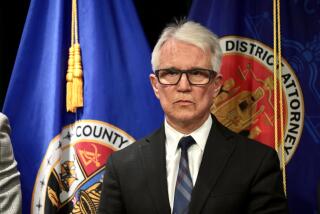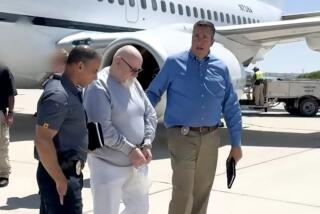Suspected ‘70s serial killer indicted in three slayings
- Share via
A man accused of being the notorious “Skid Row Stabber,” linked to a series of killings in Los Angeles during the 1970s, has been indicted on murder charges involving the slayings of three men, according to court records unsealed Tuesday.
Bobby Joe Maxwell, who has spent more than 30 years behind bars, was convicted of two murders in a 1984 trial involving 10 slayings. The 9th Circuit Court of Appeals overturned the two convictions in 2010, finding that a jailhouse informant who was a key prosecution witness was a habitual liar with “a long and public history of dishonesty.”
But Los Angeles County prosecutors said they are prepared to retry Maxwell on the two murder charges that were overturned, as well as the three other killings the grand jury indicted him on last week. Maxwell had been tried for those three deaths in 1984 as well, but the jury deadlocked on the charges. The same jury also deadlocked on two other murders, and acquitted Maxwell of three others.
Deputy Dist. Atty. Bobby Grace said Tuesday that the case involves no new evidence but that grand jurors believed there was enough to indict Maxwell even without the testimony of the jailhouse informant, who is dead.
“This was a very significant case,” Grace said. “We wanted to make sure that … he is brought to justice.”
Maxwell’s attorney, Pierpont M. Laidley, who also represented him during his 1984 trial, said he was perturbed that prosecutors had sought an indictment from the grand jury and said his client would fight the charges.
“Unless there’s something new, I believe he’s innocent,” Laidley said. “It’s been a long, arduous fight, and they’re not going to give him his freedom. We’re going to have to win it.”
Maxwell remained in prison following his successful appeal while prosecutors decided whether to retry the case.
The grand jury indicted Maxwell, 63, on charges of murdering Frank Reed and Jose Cortez, who were homeless, and Bruce Drake, who lived in a downtown Los Angeles apartment, according to the prosecutor. The indictment also accuses Maxwell of robbing Drake and Reed.
At Maxwell’s original trial, the prosecution relied heavily on the testimony of Sidney Storch, one of a notorious group of jailhouse informants used by Los Angeles authorities in dozens of murder cases in the 1970s and ‘80s. Storch told jurors that the defendant had confessed to the killings when they shared a cell in a Los Angeles County jail.
Storch, a career criminal, testified for the prosecution in at least half a dozen trials and received reduced sentences and other considerations for helping secure convictions. Other jailhouse informants said he taught them the art of “booking” fellow inmates in exchange for lighter sentences and other favors. The technique involved gaining access to high-profile defendants, finding information about their cases from newspapers and then contacting authorities to offer to testify against them, alleging that they had confessed.
Storch was accused of perjury following a Los Angeles County grand jury investigation into the use of jailhouse informants by local prosecutors and police, but he died in a New York jail before he could be extradited to California.
The 9th Circuit panel found that Storch perjured himself during Maxwell’s trial and that the district attorney’s office failed to disclose to Maxwell’s attorneys Storch’s work as a sophisticated informant who had secured benefits from authorities in exchange for his help.
The panel described the prosecution’s best physical evidence linking Maxwell to any of the crime scenes as a palm print on a public bench found near the body of one of the victims. Defense attorneys argued that the print was found in an area where Maxwell had been days before the killing.
When police arrested Maxwell in 1979, they found a knife consistent with the weapon used by the killer. During the trial, prosecutors cast Maxwell as a Satan worshiper who killed to deliver souls to the devil.
More to Read
Sign up for Essential California
The most important California stories and recommendations in your inbox every morning.
You may occasionally receive promotional content from the Los Angeles Times.














